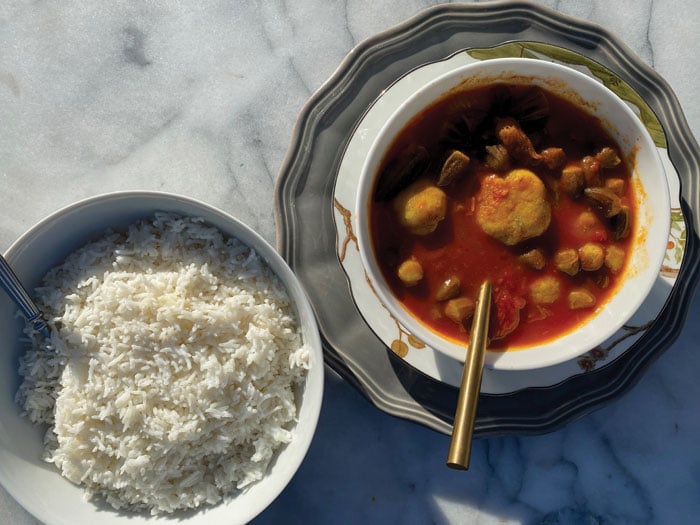 Photo by Alexandra Gomperts
Photo by Alexandra Gomperts My first memory of my grandmother Savta Rosa is at the wedding of her youngest son Aryeh in Israel. At the time, I was seven years old and living in Sydney, Australia.
The granddaughter of a rabbinic judge, she was born in Baghdad at the turn of the century. Tall, blonde and blue-eyed, she was renowned for her beauty and her intelligence. By all accounts, my grandfather Rafi was besotted with her and together they had nine children. He was the proprietor of a very successful wholesale food business. He moved his family from the crowded alleys of the Jewish center of Baghdad to the upper-class district of Kerrada, where the wealthier Jews lived in large waterfront houses on the Tigris River.
My great-aunts would reminisce about youthful afternoons whiled away at my grandparents home. And all the goodies that would appear from their underground cellar that was filled to the brim with dried dates, nuts, jams, cheeses and other delicacies.
When my grandparents emigrated to Israel in Operation Ezra and Nehemiah, they were able to avoid the ma’abarot, the miserable transit camps that were the fate of many immigrants from Arab lands. They lived in a house in Tel Aviv. When the Baghdadi Jews began to settle in Ramat Gan, my father and his brothers built them a house there. A decade later, my grandfather passed away before I ever got to meet him.
My children were lucky enough to taste my grandmother Nana Aziza’s Kubbah Bamia and they loved it.
Over the years, I would visit my quiet and dignified grandmother and we would converse in Iraqi Judeo-Arabic, a language I learned from my other grandmother, Nana Aziza.
Like my Nana Aziza, she would always serve tea with Baba Tamar, crispy coookies with a date filling. On Friday afternoons, she would have a big pot of Kubbah Bamia, okra stew with semolina balls stuffed with a ground meat filling. My uncles would sit in her backyard and enjoy several bowls of her delicious Kubbah.
Thirty years after her passing, my father still remembers her Kubbah Bamia as his favorite dish.
My grandmother Nana Aziza also made Kubbah Bamia. I remember sitting in her kitchen watching her form the balls from semolina dough and then stuff them with ground beef, grated onion and finely chopped parsley.
The Kubbah were steamed in a sweet and sour tomato broth studded with sweet butternut squash and thickened with the addition of okra. I guess bamia wasn’t so readily available in Australia, so she would use canned okra from Greece.
(Nowadays, fresh okra is easy to find at the Persian markets and the bags of frozen okra are really delicious.)
My children were lucky enough to taste my grandmother Nana Aziza’s Kubbah Bamia and they loved it. After her passing, I would always cook okra stew minus the Kubbah. I was too intimidated to even try. Rachel pushed me to do it and together we made the most beautiful Kubbah. The shells were thin and didn’t fall apart when cooked in the stew and the dough was soft enough to absorb the flavor of the soup. Served over fluffy basmati rice, it’s heaven in a bowl.
Kubbah Bamia is a labor of love. For me, it’s a way of transmitting the love that my grandmothers gave to me.
Kubbah Bamia is a labor of love. For me, it’s a way of transmitting the love that my grandmothers gave to me.
One day, when you have a little love, time and patience, maybe you will try our recipe for Kubbah Bamia.
Semolina Kubbah
1 pound ground beef
1/2 cup finely chopped Italian parsley
1 medium onion, grated
2 teaspoons baharat spice
1 teaspoon kosher salt
1/2 teaspoon pepper
For the dough
1 cup farina
1 cup semolina
1/4 pound ground beef
1 cup warm water
1 teaspoon kosher salt
1/2 teaspoon pepper
- In a large bowl, combine one pound ground beef, Italian parsley, grated onion, baharat, salt and pepper. Set aside.
- In a second large bowl, combine farina and semolina, the 1/4 pound of ground beef, water, salt and pepper until incorporated. Cool in refrigerator for at least 30 minutes.
- Wet palms with water and roll the dough mixture into walnut-sized balls and place on a tray lined with parchment or wax paper.
- Flatten each dough ball into your palm and place a large teaspoon of filling in the center.
- Gently gather the sides of the dough to cover the filling and delicately pinch closed and roll into a ball.
- Place the stuffed kubbah balls on a tray, loosely cover and leave in the refrigerator for at least 4 hours.
- Gently drop the balls into a pot of boiling soup and cook for about 25 minutes.
- Raw kubbah can be frozen for up to 2 months.
Okra Stew
2 tablespoons avocado oil
2 large onions, finely chopped
6 cloves garlic, minced
4 celery stalks, finely chopped
3 Roma tomatoes, chopped
2 cups butternut squash,
peeled and diced
1 teaspoon paprika
1 teaspoon turmeric
3 tablespoons tomato paste
1 cube chicken consommé
4 tablespoons sugar
2 lemons, juiced
1 14 ounce can chopped tomatoes
6 cups water
Salt and pepper to taste
2 pounds fresh or frozen okra
- In a large pot, warm oil over medium heat, then add onions and sauté until translucent.
- Add garlic, celery, tomatoes, butternut squash, paprika and turmeric, then simmer about 10 minutes, until vegetables soften.
- Add tomato paste, chicken consommé, sugar, lemon juice, chopped tomatoes, water and salt and pepper. Stir well, cover and let simmer for 20 minutes.
- Add okra, cover and simmer for 10 minutes.
- Very gently drop the Kubbah balls into the stew, making sure that the liquid covers the Kubbah completely.
- Reduce heat to low, cover pot and cook for 25-30 minutes.
Sharon Gomperts and Rachel Emquies Sheff have been friends since high school. They love cooking and sharing recipes. They have collaborated on Sephardic Educational Center projects and community cooking classes. Follow them on Instagram @sephardicspicegirls and on Facebook at Sephardic Spice SEC Food. Website: sephardicspicegirls.com/full-recipes























 More news and opinions than at a Shabbat dinner, right in your inbox.
More news and opinions than at a Shabbat dinner, right in your inbox.